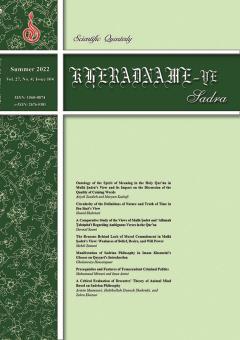Manifestation of Sadrian Philosophy in Imam Khomeini’s Glosses on Qayṣarī’s Introduction
Subject Areas : مطالعات حوزه عرفان و کلام اسلامی
1 - Assistant professor, Research Institute of Imam Khomeini and Islamic Revolution, Tehran, Iran
Keywords: Substances, individuation, Accidents, Sadrian philosophy, merciful soul, Qayṣarī, Imam Khomeini,
Abstract :
The fourth chapter of Qayṣarī’s Introduction to Ibn ‘Arabī’s Fuṣūṣ al-ḥikam discusses substances and accidents following a gnostic approach and is mainly intended to explain the merciful soul. However, there is also an extensive discussion of gnostics’ merciful soul using a philosophical language. Imam Khomeini has criticized Qayṣarī’s explanation in a commentary based on the Transcendent Philosophy. At the end of the same chapter, Qayṣarī has mentioned some points about the meaning of individuation and its types. In another commentary, Imam Khomeini has provided an accurate explanation of different types of individuation using a gnostic language. This meaning of individuation and its types as discussed by Qayṣarī has been almost completely propounded in the third chapter of the fourth level of general affairs in al-Asfār, which reflects the great influence of Ibn ‘Arabī’s gnostic tradition, in general, and Qayṣarī’s Introduction, in particular, on Mullā Ṣadrā’s philosophy. In Qayṣarī’s view, accidents must function as the differentia of substances while, in the view of Mullā Ṣadrā and, following him, Imam Khomeini, Substance is the differentia of substance and not accident. Qayṣarī believes that sometimes individuation is the same as essence and sometimes an addition to it. Nevertheless, Imam Khomeini maintains that individuation does not essentially apply to the essence of Almighty Truth because it is among the effects of attributive manifestations. However, what enjoys the oneness of all individuations is the supreme name and perfect Man. The main purpose of this paper is to provide an accurate explanation, analysis, and criticism of Qayṣarī’s Introduction and Imam Khomeini’s commentary on this work. Imam Khomeini has criticized Qayṣarī in one commentary based on the Sadrian philosophy and, in another one, has discussed his own standpoints based on, in fact, a part of al-Asfār.
آشتياني، سيدجلالالدين (1380) شرح مقدمه قيصري، قم: بوستان كتاب.
اردبيلي، سيدعبدالغني (1385) تقريرات فلسفه امام خميني، تهران: مؤسسة تنظيم و نشر آثار امام خميني.
اصفهاني، صائنالدين ابنتركه (1387) تمهيد القواعد، تصحيح و تعليق سيدجلالالدين آشتياني، قم: بوستان كتاب.
جلوه، ابوالحسن (1385) مجموعه آثار حكيم جلوه، مقدمه و تصحيح حسن رضازاده، تهران: حكمت.
جوادي آملي، عبدالله (1382) رحيق مختوم، مجلد 6 و 9، تنظيم و تدوين حميد پارسانيا، قم: اسراء.
حسنزاده آملي، حسن (1393) شرح فارسي الاسفار الاربعة، قم: بوستان كتاب.
الحيدري، السيد كمال (1436ق) شرح تمهيد القواعد في علم العرفان النظري، تقريراً لابحاث المرجع الديني السيد كمال الحيدري بقلم محمد الربيعي، قم: مؤسسة الامام الجواد(ع) للفكر و الثقافة
. خميني، روحالله (1381) مصباحالهداية الي الخلافة و الولاية، مقدمه سيدجلالالدين آشتياني، تهران: مؤسسه تنظيم و نشر آثار امام خميني(ره).
خميني، روحالله (1386) شرح دعاء السحر، تهران: مؤسسه تنظيم و نشر آثار امام خميني(ره).
خميني، روحالله (1410 ق) تعليقات علي شرح فصوصالحكم، قم: مؤسسة پاسدار اسلام.
خميني، سيدحسن (1394) تحرير توحيد، تحقيق و نگارش سيدمحمود صادقي، تهران: مؤسسة چاپ و نشر عروج.
طوسي، نصيرالدين محمد (1384) شرح الاشارات و التنبيهات، بهانضمام محاكمات قطبالدين الرازي، تحقيق كريم فيضي، قم: مؤسسة مطبوعات ديني.
فاضل توني، محمدحسين (1386) مجموعه رسائل عرفاني و فلسفي، قم: مؤسسة مطبوعات ديني.
فناري، شمسالدين محمد (1388) مصباح الانس، تحقيق محمد خواجوي، تهران: مولي.
قونوي، صدرالدين محمد (1388) مفتاح الغيب، تحقيق محمد خواجوي، تهران: مولي.
قيصري، شرفالدين داوود (1381) «اساس الوحدانية»، در رسائل قيصري، تصحيح سيدجلالالدين آشتياني، تهران: مؤسسة پژوهشي حكمت و فلسفه ايران.
قيصري، شرفالدين داوود (1397) شرح فصوصالحكم، تصحيح حسن حسنزاده آملي، قم: بوستان كتاب.
ملاصدرا (1380) الحكمة المتعالية في الاسفار الاربعة، ج2، تصحيح و تحقيق مقصود محمدي، تهران: بنياد حكمت اسلامي صدرا.
ملاصدرا (1397) الحكمة المتعالية في الاسفار الاربعة، ج4، تصحيح و تحقيق مقصود محمدي، تهران: بنياد حكمت اسلامي صدرا.

